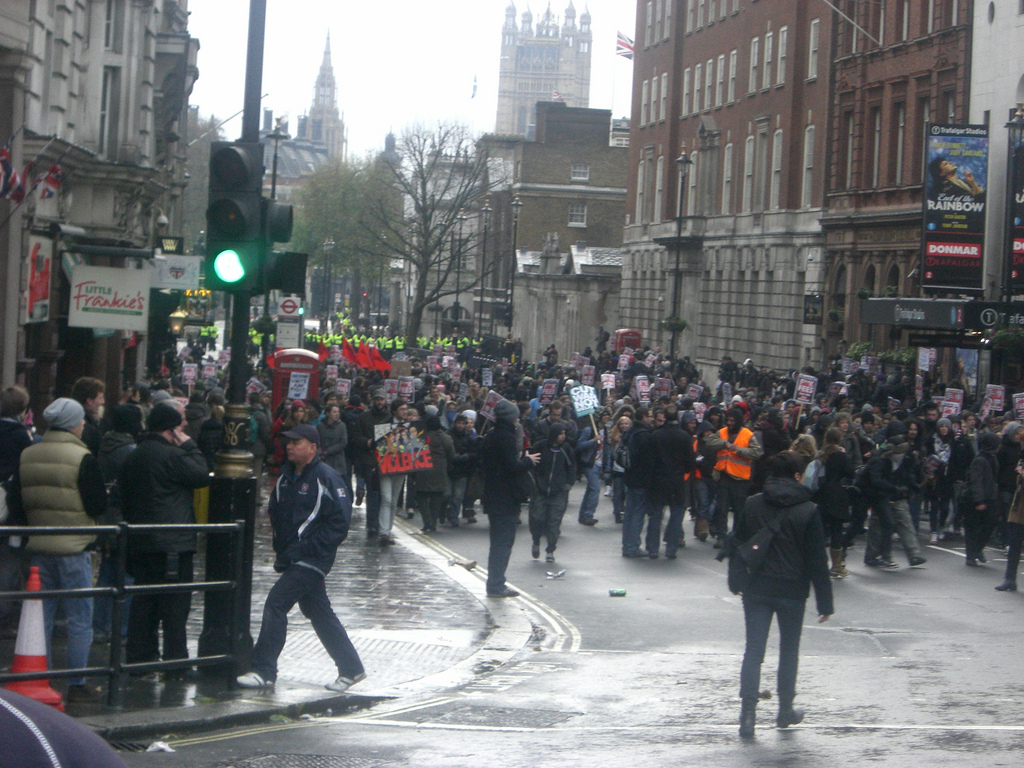By Andrea Marrinan
Last week, students and lecturers united on the streets of London to voice their rage at UK government plans to raise tuition fees.
In a full response to Lord Browne’s review of higher education and finance last month, the government announced that from 2012, British education institutions will be able to charge almost three times the current fees level of £3290.
David Willetts, the universities minister, proclaimed proposals to raise the tuition fee cap to £6000, with the possibility of raising it to £9000 in exceptional circumstances.
Such cuts in the undergraduate-teaching budget were described by Gareth Thomas, the Labour shadow universities minister, as a “tragedy for a whole generation of young people”. He raised concern that students would be forced to choose the cheapest course available rather than their desired one.
Willetts fought back, arguing that the government’s proposal was a “coherent and progressive” policy. He further stated that it was realistic to expect those benefiting from higher education to contribute to its cost and that graduates must pay more to guarantee Britain’s campuses remained the second best in the world.
Many fear that increasing fees may lead to the the privatisation of higher education. However, Michael Gove, secretary of state for education, has denied such a risk. He told the BBC Radio 4’s Today programme that there was “no evidence” that the introduction of tuition fees in 2006 had put off underprivileged students and that no matter the cost, students would base their decision on the benefits of furthering their education.
Gove highlighted the fact that some of the UK’s best universities were not inventive in attracting students from all social backgrounds and guaranteed that the government would fund a £150m bursary system to encourage the most disadvantaged students to apply.
The claimed purposes of the government’s proposal is to ensure that the university sector will be properly funded, to improve the quality of teaching, to increase social mobility and to attract a higher proportion of students from disadvantaged backgrounds. With regard to the possibility of student debt, Willetts stressed that only successful graduates would pay charges.
Presenting a “progressive” repayment system Willetts explained that university graduates would not make contributions until they were earning at least £21,000. Students would start repaying their loans at 9 percent of their income at a real rate of interest. Any unpaid loans would be written off after 30 years.
The plans were met with fury and disbelief, and a protest was immediately arranged by the NUS and lecturers’ union, the UCU.
The scale of the protest exceeded expectations, with an estimated 50,000 protesters waving banners and chanting as they marched past the government’s offices in the Whitehall district. However, the early peaceful scene was soon interrupted by a group of activists who broke off from the main route and attacked the headquarters of the Conservative Party in central London. Windows were broken, placard sticks, eggs and bottles were hurled at police officers attending the scene and a fire extinguisher was even thrown from the roof.
A police report stated that at least eight people – “a mixture of police and protesters” – had been injured, and a number of arrests had been made.
These proposals were made by the UK government in a cross-departmental attempt to whittle down a record debt.
David Cameron condemned the protesters who tried to ransack Conservative headquarters, he vowed that he would not back down on commitments to treble tuition fees.
Many believe that last week’s violence was not an isolated incident, but rather the start of a new era of social unrest in the UK due to the government’s aggressive approach in tackling its budget deficit through spending cuts.






